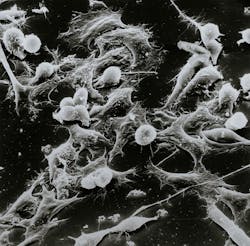A Yale Cancer Center research team has identified novel oncogenic gene fusions in lung and pancreatic cancer, as well as sarcoma, according to a news release.
The fusions involve RASGRF1 (an activator of RAS signaling) and promote cellular changes leading to tumor development. The research is described online ahead of print in Clinical Cancer Research.
The research team studied 103 lung adenocarcinomas in the Yale Lung Cancer Biorepository collected from individuals with minimal smoking history to assess the frequency of known oncogenic mutations in these tumors and to identify potential new oncogenic alterations. The team performed whole-exome sequencing and RNA sequencing on a subset of these tumors at the Yale Center for Genome Analysis and identified an established oncogenic mutation in 98 of the 103 tumors.
Through further analysis of one of the tumors that lacked a known oncogenic alteration, they found a novel gene rearrangement causing a fusion between two genes called OCLN and RASGRF1.
Using public databases of sequenced human cancer cell lines and tumors, the team identified two similar RASGRF1 fusions in pancreatic cancer and in sarcoma and demonstrated that these three fusions turn on RAS signaling and have tumor-promoting properties in cells. The research findings were established in part with mouse models through a collaboration with the Yale Center for Precision Cancer Modeling. From a small molecule inhibitor screen performed at the Yale Center for Molecular Discovery, the research team determined that cells containing RASGRF1 fusions are sensitive to trametinib, a targeted therapy that blocks a pathway activated by RAS signaling.
While these fusions are uncommon, they occur in several types of cancer and our findings suggest a potential treatment strategy for advanced tumors with these fusions.
“Through the collaborative efforts of several Yale Cancer Center Shared Resources, we characterized a new class of oncogenic fusions. While these fusions are uncommon, they occur in several types of cancer and our findings suggest a potential treatment strategy for advanced tumors with these fusions,” said Frederick Wilson, MD, PhD, Assistant Professor of Medicine (Medical Oncology) and senior author of the paper.

